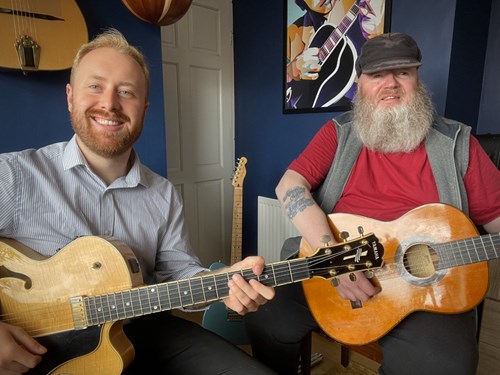Blind LCME candidate achieves great score in Digital Live Exam
At London College of Music Examinations, it’s important to us that our exams are accessible to anyone and everyone who wants to develop their performance skills and progress in their musical education.
The introduction of our digital offering – live online and recorded exams – in 2020 has already opened up the opportunity to take exams to many more students right across the world. Over the last two years for example, we have conducted our first exams in remote areas like Nepal and Eswatini, where candidates were previously unable to take in-person exams because there are no test centres in these areas.
However, our mission to make our exams available for everyone, is not just about reaching those in challenging locations, LCME exams are also accessible for candidates with disabilities.
We recently conducted a live online exam with an amazing student, Gary, who is blind. Gary took his Grade One Acoustic Guitar exam and achieved an incredible score of 96/100.
Lewis Kilvington, who is Gary’s guitar teacher, said, “I’ve not taught anyone who is blind before and this has been a whole new teaching experience for me. It has been really rewarding. Gary found the whole exam process really enjoyable and it’s fantastic to see how well he has done!”
“I’m a big advocate of LCME exams,” he continued, “I actually did my grade eight exam with LCME many years ago and have had many of my students sit them successfully.”
Gary’s exam was assessed by LCME Examiner, Harrison Marsh, who was given some expert advice on how to approach the sight-reading portion of the exam by fellow examiner, Diane Ashton, who has a background transcribing braille music and previously worked for RNIB.
“Usually in this situation, when a student is unable to do the sight-reading portion of the test, we would give them an accompaniment in braille beforehand and some additional time to memorise this as part of the exam,” explains Diane. “The piece we ask the student to play would be from a lower grade, to compensate for the additional difficulty of them having to memorise it.”
“With Gary it was a little different because we were under certain time constraints, so we had to come up with an alternative method. Instead of having him memorise the accompaniment, we asked him to play a piece from the LCME acoustic guitar book he had been learning from. This fulfilled the exam criteria by demonstrating he was able to play an accompaniment at grade one.”
As Diane indicates, every candidate is different, but provision can be made to accommodate anyone who wants to take an LCME exam: “Some candidates who are registered blind but have some vision, may prefer to have enlarged print for their sight reading, or have the piece printed on yellow paper instead of white to reduce the glare. While those playing instruments are unable to do sight readings, because they need their hands to play, singers may be able to use braille. In all cases we ensure partially sighted or blind candidates are given pieces at an appropriate level and have extra time to familiarise themselves with the music so they have the same opportunity for success as fully-sighted candidates,” she says.

Guitar teacher, Lewis Kilvington, with his student, Gary.
Keep up to date with everything we’re up to on social media. Follow us on Facebook, Twitter, LinkedIn and Instagram.
 EN
EN
 IT
IT
 TR
TR